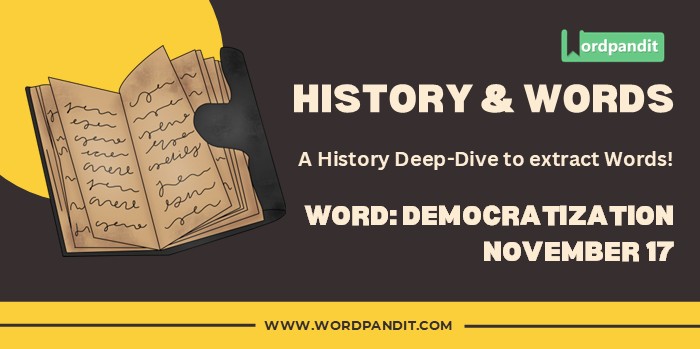History & Words: 'Democratization' (November 17)
Welcome to 'History & Words.' 🌟 I'm Prashant, founder of Wordpandit and the Learning Inc. Network. This series combines my passion for language learning with historical context. Each entry explores a word's significance on a specific date, enhancing vocabulary while deepening understanding of history. Join me in this journey of words through time.
📚 Table of Contents
🔍 Word of the Day: Democratization
Pronunciation: /dɪˌmɒkrətaɪˈzeɪʃən/ (dee-MOK-ruh-tye-ZAY-shun)
🌍 Introduction
On November 17, 1989, students gathered in Prague to commemorate International Students' Day, initiating what would become known as the Velvet Revolution. This peaceful uprising in Czechoslovakia exemplified the process of democratization, demonstrating how non-violent resistance could transform an authoritarian state into a democratic society.
The events in Czechoslovakia formed part of a broader wave of democratization sweeping across Eastern Europe in 1989, as communist regimes fell one by one. The term "democratization" captured not just the political changes but the complete transformation of society that such transitions require.
The Velvet Revolution stands as one of history's most successful examples of peaceful democratization, showing how civil society can mobilize to create fundamental political change without violence.
🌱 Etymology
The word "democratization" combines "democratic" (from Greek "demokratia" - rule by the people) with the suffix "-ization" (denoting a process or system of change). This construction emphasizes that democracy is not merely a state but a dynamic process of transformation.
📖 Key Vocabulary
- 🔑 Civil Society: The network of associations and relationships operating independently of the state
- 🔑 Regime Change: The replacement of one political system with another
- 🔑 Transition: The period during which a society moves from one political system to another
- 🔑 Popular Sovereignty: The principle that political authority derives from the people
- 🔑 Constitutional Democracy: A system of government based on popular sovereignty and limited by law
🏛️ Historical Context
The late 1980s saw unprecedented changes in Eastern Europe, sparked by Mikhail Gorbachev's policies of perestroika and glasnost in the Soviet Union. These reforms weakened Moscow's control over its satellite states.
Czechoslovakia had experienced previous attempts at democratization, most notably the Prague Spring of 1968, which was crushed by Soviet tanks. This historical memory influenced the peaceful approach of the 1989 revolution.
The broader context included similar movements across Eastern Europe, including Poland's Solidarity movement, Hungary's opening of its border with Austria, and the fall of the Berlin Wall just days before the Velvet Revolution began.

⏳ Timeline
- August 1968: Prague Spring suppressed by Soviet invasion
- June 1989: Poland holds first semi-free elections
- November 9, 1989: Berlin Wall falls
- November 17, 1989: Student demonstration in Prague initiates Velvet Revolution
- November 19, 1989: Civic Forum established
- November 27, 1989: General strike paralyzes Czechoslovakia
- December 29, 1989: Václav Havel elected president
- June 1990: First free elections held
🌟 The Day's Significance
November 17, 1989, began as a student commemoration but evolved into a catalyst for nationwide change. When security forces violently suppressed the peaceful student demonstration, public outrage triggered widespread protests.
The day's events demonstrated key elements of successful democratization: the role of civil society, particularly students and intellectuals; the importance of peaceful resistance; and the power of public demonstration to delegitimize authoritarian rule.
The response to police violence showed how democratization often requires a "trigger event" that crystallizes public dissatisfaction into active resistance.
💬 Quote
"Truth and love must prevail over lies and hatred." - Václav Havel, playwright, dissident, and first president of democratic Czechoslovakia
🔮 Modern Usage and Reflection
Today, "democratization" remains a central concept in political science and international relations. Scholars study the Velvet Revolution and similar transitions to understand how societies can successfully transform from authoritarian to democratic systems.
The term has expanded beyond purely political contexts to describe various processes of making institutions more accessible and participatory, from corporate governance to technological access.
🏛️ Legacy
The Velvet Revolution's success established a model for peaceful democratic transition. Its influence can be seen in subsequent movements, from Serbia's Bulldozer Revolution to Ukraine's Orange Revolution.
The experience of Czechoslovakia (later the Czech Republic and Slovakia) demonstrated that democratization involves not just political change but comprehensive social and economic transformation.
🔍 Comparative Analysis
While initially viewed primarily as a political process, modern understanding of democratization emphasizes its cultural and social dimensions. Success requires not just institutional changes but the development of democratic values and practices throughout society.
💡 Did You Know?
🎓 Conclusion
The events beginning November 17, 1989, in Czechoslovakia exemplify how democratization can occur through peaceful means, demonstrating that profound political transformation need not involve violence. This legacy continues to inspire democracy movements worldwide.
📚 Further Reading
- 📘 "The Magic Lantern: The Revolution of '89 Witnessed in Warsaw, Budapest, Berlin, and Prague" by Timothy Garton Ash
- 📗 "Problems of Democratic Transition and Consolidation" by Juan J. Linz and Alfred Stepan
- 📙 "The Power of the Powerless" by Václav Havel














